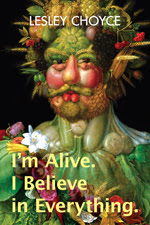I’m Alive. I Believe in Everything.
I’m
Alive. I Believe in Everything.
By
Lesley Choyce
Breton
Books (2012)
An autobiography is
probably the most mainstream literary device used by a person to summarize his
or her life. However, one can argue that a collection of poems penned over
decades may provide even more intimate recollections representative of precise
moments in a person's history.
Such is the case with
Lesley Choyce’s I’m
Alive. I Believe in Everything, a
collection of new and previously published poems written over a span of 40
years.
Comparing Choyce’s
anthology to an autobiography is by no means suggesting he’s “getting on in
years”. In fact, reading his latest published works—that migrate across North
America and overseas—I found myself thinking this Lawrencetown-based poet,
novelist, professor, publisher and surfer is among those that will far surpass the
average human life expectancy.
The Toronto Star once referred to Choyce as
“Thoreau in our midst.” This reference stands strong in I’m Alive, as numerous biomes are
lyrically explored. An excerpt from “Medicine Walk” is just one example:
…and do not ask how
boulders
covered with star moss
wind-bowed
apple branches
or
the song of a small chanting brook
can
salvage you
but
they will.
If I may be so bold,
some of Choyce’s verse also brings to mind Jack Kerouac’s On the Road—even before the
poem “Encounter with an Immortal,” which makes reference to the Beat writer,
appears in the book—because of Choyce’s depiction of outside the norm
adventures and the idiosyncrasies of individuals momentarily encountered (i.e. the grizzled farmer rolling
cigarettes with one hand or the young, chubby sweetheart
short-order cook with eyes cut out from magazines in “Saskatoon Bus Depot: 8a.m.
Sunday”).
In addition to Choyce’s artistic grouping of words and phrases, I’m Alive showcases the poet’s cleverness with metaphor and word play. (Comparing a saggy pair of pants to an old home’s skeleton in “Tom Gilbert’s Pants” is one example of the former; incorporating terms like howl and sutra in “Best Minds,” a poem dedicated to Allen Ginsberg, is an illustration of the latter.)
The first and title poem
of I’m Alive serves as an effective introduction to
the rest of the collection; it presents a taste of the varied themes yet to
come—from both the natural and man-made worlds, the beings and inanimate objects
that occupy these worlds and their interrelationships. But the opening poem
does not resonate with me as much as numerous other extracted gems, such as
“Bodhisattvas Always Finish Last” (describing a hitchhiker, with nothing but
lint in his pocket, feeling ultimate freedom) and “Fog” (following the thick
cloud through the light and dark of Halifax):
We
are with you, fog,
stalled
high up in your forest on the bridge at night
over
the harbour heaped with your awful soft foliage.
To
jump tonight would be to dissolve slowly to sweat and salt
[…]
We’re
with you fog
hiding
out in the Public Gardens after dark
locked
in between the massive Victorian swing gates
we’re
with you nibbling at the leaves of trees
planted
by English kings and princesses
I suspect that I, and
many readers, will revisit I’m
Alive again and again,
perhaps until Choyce comes out with his next forty-year collection… ~MB



